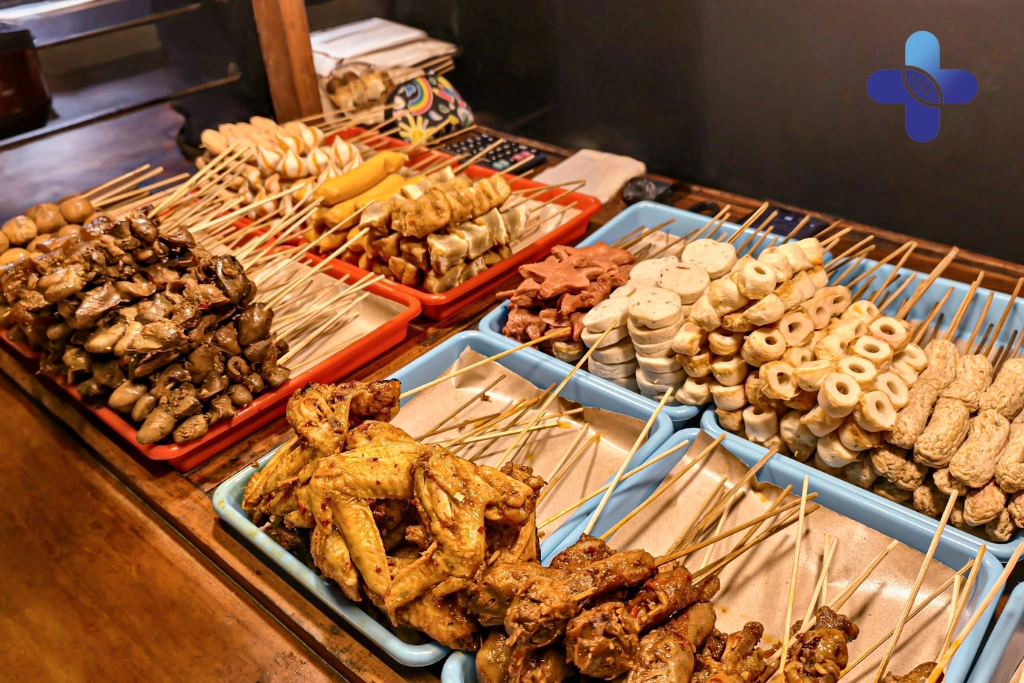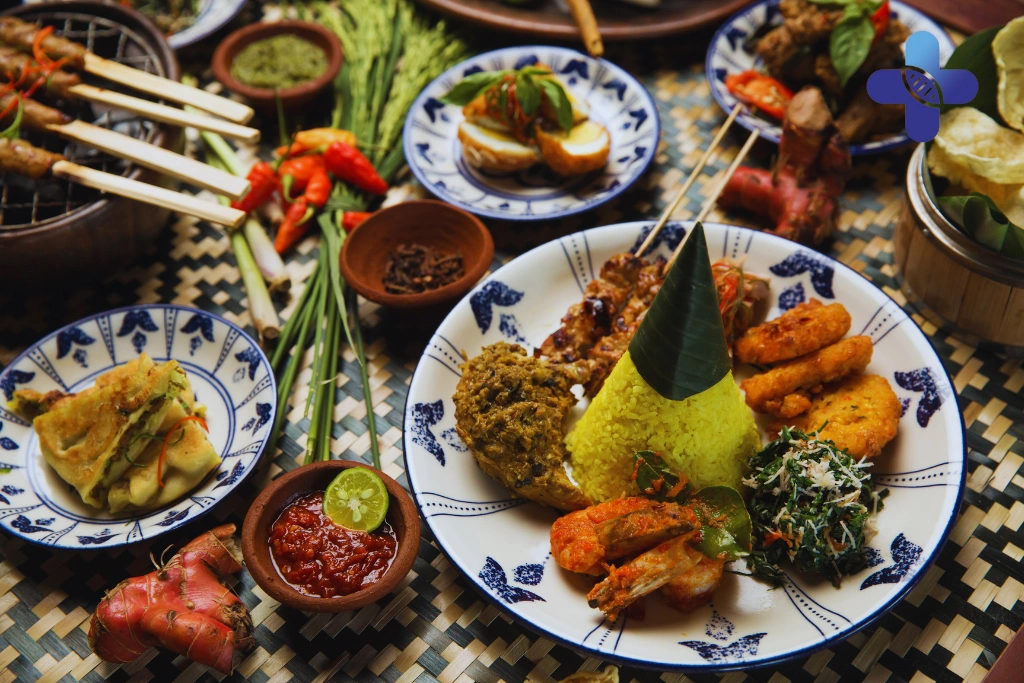Bali’s street food scene is a feast for the senses — from sizzling satay to fragrant nasi goreng served roadside. Yet behind these irresistible flavors, there are real street food Bali risks that every traveler should know. Differences in hygiene standards, food handling, and water quality can sometimes lead to mild stomach troubles, often known as Bali Belly in Bali. Understanding these risks doesn’t mean avoiding street food altogether — it means enjoying it safely, with awareness and care for your digestive health.
Enjoying Street Food in Bali? Here’s What You Need to Know to Stay Healthy

Why Street Food Is So Popular in Bali
Bali’s street food scene is more than just a quick meal — it’s a cultural experience. Locals and travelers gather around small warungs, enjoying freshly cooked dishes with friends and family. From bakso soup carts to grilled seafood on the beach, the island’s street food is diverse, affordable, and full of flavor.
However, hygiene standards can vary between vendors. Some stalls handle food safely, while others might reuse oil, leave sauces uncovered, or wash dishes with non-filtered water. Understanding these differences helps you enjoy street food in Bali while minimizing health risks.
The Hidden Health Risks Behind Street Food
Even though street food in Bali is delicious, it can sometimes pose health risks if prepared or stored incorrectly. Common issues include:
- Food kept at unsafe temperatures.
- Ingredients washed with contaminated water.
- Uncovered sauces attracting flies or dust.
- Improperly cleaned utensils or cutting boards.
These conditions can lead to mild digestive problems, often called “traveler’s stomach”, or more commonly in Bali — Bali Belly.
At Life Everyouth Bali, our medical team often treats visitors who experience nausea, bloating, or diarrhea after trying street food for the first time. It’s rarely serious, but it can ruin your holiday if you’re not careful. Understanding food safety in Bali is the first step to prevention.
How to Choose Safe and Clean Street Food Vendors

You don’t have to avoid street food — you just need to be smart about where you eat. Follow these simple tips for healthy eating in Bali:
- Choose busy stalls. A high turnover means food is cooked fresh and hasn’t been sitting out for long.
- Watch the cooking process. Pick vendors who cook in front of you, using high heat that kills bacteria.
- Avoid exposed sauces or ice. Contaminated ice and open condiments are common sources of bacteria.
- Check cleanliness. Look for gloves, clean utensils, and tidy food displays.
- Stick to cooked foods. Avoid raw salads or unpeeled fruits, as they may be washed in unsafe water.
Enjoying street food is part of Bali’s charm — just make safety your top ingredient.
What to Do If You Experience Digestive Discomfort
Even with precautions, your stomach might still react to new spices or bacteria. Common signs of mild digestive upset include nausea, cramps, bloating, or diarrhea.
If you start feeling these symptoms, stay hydrated and rest. But if discomfort continues or you feel weak or dizzy, it’s best to seek professional care.
At Life Everyouth Bali, we offer a specialized Bali Belly IV Drip designed to help you recover faster.
It restores hydration, replenishes electrolytes, and supports your immune system so you can safely get back to enjoying your vacation.
💧 Need fast relief? Visit our clinic in Sanur or Jimbaran to learn more: Bali Belly IV Drip
Stay Adventurous, But Stay Safe
Street food in Bali can be a highlight of your trip — just remember to eat smart and stay hydrated.
If you ever feel unwell, our doctors at Life Everyouth Bali are ready to help with modern, professional care for travelers and expats.
Enjoy Bali’s amazing flavors responsibly — your stomach (and your holiday) will thank you!
Conclusion The Hidden Risks of Eating Street Food in Bali

Eating street food in Bali is an incredible way to experience the island’s local culture — as long as you keep hygiene and hydration in mind.
By choosing clean, busy vendors and avoiding raw or exposed foods, you can enjoy every dish safely and confidently.
And if your stomach ever feels uneasy, Life Everyouth Bali is here with expert care and our effective Bali Belly IV Drip to help you recover quickly.
Before your next meal, make sure you also read our next guide: Is Tap Water in Bali Safe to Drink?
Frequently Asked Questions (FAQ) The Hidden Risks of Eating Street Food in Bali
Is it safe to eat street food in Bali?
Yes, it’s generally safe when you choose clean, busy stalls that cook food fresh. Always observe how food is prepared before ordering.
What should I avoid eating in Bali?
Avoid raw salads, unpeeled fruits, and sauces left uncovered under the sun. These foods can easily carry bacteria that upset your stomach.
Can I drink tap water in Bali?
No, tap water in Bali is not safe for drinking or brushing teeth. Always use bottled or filtered water to stay healthy.
What are early signs of food-related stomach problems?
Symptoms include cramps, bloating, nausea, or mild diarrhea. They often appear within a few hours after eating contaminated food.
Should I take probiotics before traveling to Bali?
Yes, probiotics help strengthen your digestive system before your trip. They can reduce your risk of developing Bali Belly in Bali.
Where can I get medical help if I get sick in Bali?
Visit Life Everyouth Bali, a trusted medical clinic in Bali with 24/7 traveler care. Our doctors provide safe, modern treatment for digestive issues.
How do I stay hydrated after stomach issues?
Drink fluids with electrolytes or try the Bali Belly IV Drip at Life Everyouth Bali. It quickly restores your hydration and energy levels.
What makes the IV Drip effective?
The Bali Belly IV Drip replenishes fluids and vital minerals while boosting recovery. It’s a safe and fast way to feel better after food-related illness.
Can spicy food cause stomach upset?
Yes, local spices and chili can irritate your stomach if you’re not used to them. Start with milder dishes and increase spice gradually.
Is it okay to eat from warungs (local stalls)?
Yes, local warungs are part of Bali’s authentic food culture. Just make sure they cook food fresh and keep utensils clean.
